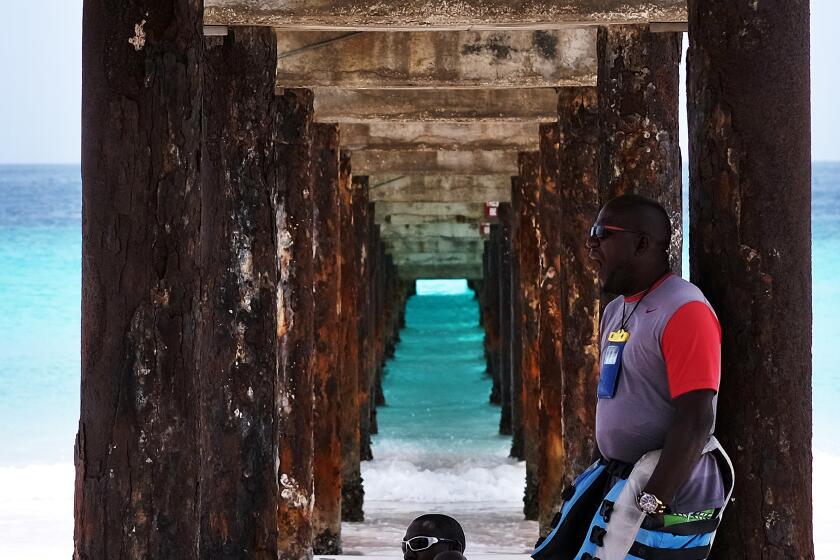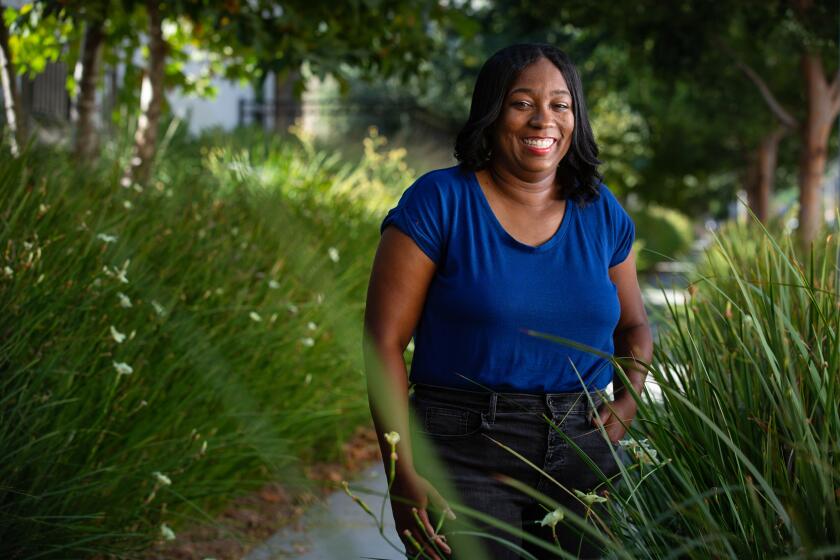Novelist Kaitlyn Greenidge thinks the Song of Solomon is ‘the “WAP” of the Bible’
On the Shelf
Libertie
By Kaitlyn Greenidge
Algonquin: 336 pages, $27
If you buy books linked on our site, The Times may earn a commission from Bookshop.org, whose fees support independent bookstores.
Kaitlyn Greenidge’s explosive 2016 debut novel, “We Love You, Charlie Freeman,” approached American racism through the perspective of a Black family hired by a scientific institute to teach American Sign Language to a chimpanzee. In “Libertie,” Greenidge takes a more international approach. Her second novel is loosely based on the life of Susan Smith McKinney Steward, the first Black woman doctor in the state of New York. In Greenidge’s version of the story, Dr. Catherine Sampson has skin as light as her daughter Libertie’s is dark; the pair have plenty of other differences too. Cathy would have Libertie follow her path in medicine, while Libertie feels drawn to music.
From her early life in Brooklyn to her brief schooling in Ohio and on to married life in Haiti, Libertie seeks a way of life that will allow her to use her intellect and celebrate her femininity. Unfortunately, when she and her new husband arrive at his family home in Haiti’s Jacmel, she discovers that even a society without white slaveholders has layers of caste and privilege, none of which are to her advantage. Greenidge’s immersive story asks many questions, answers few and heralds a blossoming literary career.
Greenidge spoke with The Times via video from her screened back porch in New England, about colorism, Meghan and Harry, and the Song of Solomon, “the ‘WAP’ of the Bible.”
Cherie Jones’ debut novel, “How the One-Armed Sister Sweeps Her House,” focuses on the essential workers who make the tourist factory run.
We have to talk about Meghan Markle and your reactions to her recent interview with Oprah.
I love that Oprah brought every bit of herself to it, and I loved how unguarded Meghan and Harry were. But I don’t think there was anything in there that a person of color would be surprised by. Oprah knows racism exists, but in asking Meghan and Harry to walk her through why things happened, she set things up to walk multiple viewers from multiple different experiences through Meghan’s words about her own experience.
You have a billion-dollar press corps dedicated to telling you: “Your dysfunctional extended family is fine. You should be able to deal with it.” What gets lost in there is the question of Archie’s skin color. Those questions happen all the time, for anyone who has had a biracial child. Those questions were happening at the same time as the questions about his future security. That’s not poetics. That’s not a metaphor. That’s Colonialism 101.
Like Harry and Meghan, “Libertie’s” 19th century protagonist refuses to follow anyone else’s script.
It’s a little heavy-handed, but I did love using the name Libertie. It allowed me to play with the idea: What does freedom actually look like? In the United States our understanding of freedom is often intricately tied with domination. We measure freedom with what we can get away with doing to people who have less power, whether that means I have the freedom to dictate my child’s life or to take over lands that belong to Indigenous people, or I have the freedom to carry a gun as I please.
Libertie is a dark-skinned Black girl in Civil War and Reconstruction society. She’s at the bottom of all the power structures — by race, gender, age and color. I set the book during Reconstruction because, as a lot of people have pointed out, that era mirrors our own. It’s a time where Black people and abolitionists were coming up with definitions of freedom and personhood that had never been thought of in this country.
Because there were gaps, or even contradictions, in the work of the group known as the Founding Fathers.
Libertie, in her personal life, is trying to hold all these truths at once. That she’s born into a country where people are fighting for freedom, but also into a time when Black people are making the argument that we have made over and over again for generations. Some people argue that if Black people had a space of our own, an all-Black country, all these issues would be solved. Libertie attempts to find that when she moves to Haiti — and learns that the oppression has not disappeared in that country. Instead, it’s changed, due to a different power dynamic.
It’s also a utopia that doesn’t work out. Her husband, Emmanuel, tries to lead Haiti into a new era, but quickly loses control.
Right, and also when you try to name the main perpetrator of the oppression, you can lose sight of the internalized oppression that goes with it. Oftentimes people think we will keep the power structure, we’ll just get rid of the person at the top. To do the hard work of re-imagining what an equitable structure would look like can be something we think we don’t have time to do. So let’s just lop off the head and everything else will figure itself out.
I think that is what we’re experiencing right now. Some people are saying we can imagine something better. Other people are saying, “No, this structure we have is all I can imagine, so it must be good enough.”
‘Vanishing Half’ author Brit Bennett talks about the inspiration behind her bestselling novel.
Libertie finally realizes what she has to do, not just for herself but for her children.
My daughter was born while I was writing this book. I found out I was pregnant on the day I finished the first draft. I handed in the second draft and went into the hospital six hours later. But when I was drafting, I hadn’t yet had children. In literary novels, motherhood is often this really depressed and contested place. It can be that, there is drudgery in parenting, but I also know women who are both artists and mothers and find motherhood creative and generative. I wanted to explore that alternative version of motherhood, in which you’re not necessarily confined to the dust heap of history once you give birth.
How else is “Libertie” different from “Charlie Freeman”?
This book challenged me to write about things with, I guess, a certain gentleness and reverence — a little bit different tone than my first novel, which had a more ironic and detached tone. That was a real challenge for me because I find it easiest to write in the ironic voice.
One of the things that cracked it open for me was, when I got to the romantic relationship, I started to read the biblical Song of Solomon. One of my wonderful poet friends is currently working on a translation of it, and she gave me insight into how much of that part of Scripture is about women’s bodies and women’s pleasures, and it’s about colorism as well. It’s about a dark-skinned woman talking about her sexual desires. It’s basically the “WAP” of the Bible.
A Black writer depicting a Black character has be writing about race, but to me this book seemed to transcend it. There’s no white gaze.
The intellectual and philosophical challenge for me was to write a book set in the 19th century without any major white characters in it. Of course, whiteness is going to be on the periphery for these characters. How are they going to talk about the world that they live in and how they move through that world? This book is about Blackness, and freedom, and where they intersect. Even in an incredibly repressive white supremacist society like 1860s New York state, people are still going to attempt to make a way of life for themselves.
That’s the beauty of Reconstruction-era America. There was intense, racialized violence but also an incredible flowering of Black communities and culture. When you think about people two and three years out of enslavement founding colleges and hospitals and more, it’s mind-boggling. The spirit I wanted to explore in “Libertie” is that a person in a limited environment can still make a deep, strange, wonderful world for herself, a world that is not really in conversation with an oppressive structure that thinks it knows everything about her.
‘How Beautiful We Were,’ the followup to Imbolo Mbue’s acclaimed debut, ‘Behold the Dreamers,’ features an African activist fighting a world of corruption.
Patrick is a freelance critic who tweets @TheBookMaven.
More to Read
Sign up for our Book Club newsletter
Get the latest news, events and more from the Los Angeles Times Book Club, and help us get L.A. reading and talking.
You may occasionally receive promotional content from the Los Angeles Times.








